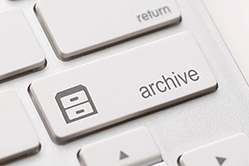How to organise your email archive
How to organise your email archive
 Companies are creating and keeping more data than ever — and some businesses are getting excited about what they can use all this ‘big data’ for.
Companies are creating and keeping more data than ever — and some businesses are getting excited about what they can use all this ‘big data’ for.
Yet the reality for many companies is that the data explosion actually equals data frustration. For all but the most disturbingly-organised individuals, essential documents are hard to locate. Files get saved in the wrong folder — and email is often the most-disorganised data of all.
Organising 12,000 emails a year
If you work in a typical office, there’s a good chance you use Microsoft Outlook to send and receive email. If you receive 50 emails a day, that’s over 12,000 emails hitting your inbox in a year.
If you decide to archive them all (after all, who knows when you might need a particular email in the future?) then finding a specific email soon becomes hard work.
In this sort of situation, the only option is to undertake an email search. And then wait. With email folders — especially the sent folder — extending into the tens or hundreds of thousands of emails, the standard Outlook search process is inadequate.
Outlook search is broken
In addition to being incredibly slow, the way Outlook works makes it difficult to find any email if you can’t remember the entire recipient list — which is hardly helpful.
It’s not uncommon for it to take over 15 minutes to find an email. Sometimes you’ll fail completely and give the whole thing up as a bad job. What a ridiculous waste of what should be highly productive time.
The problem is that even if you have a proper email archive system in place, most of these solutions are about storage, not retrieval.
Yet in a world of exploding data, effective information retrieval is an essential business tool. Most email users would bite your hand off for fast, guaranteed access to email, like a Google-style keyword search that rapidly locates the right information.
Email archive + keyword search
By combining an archive of every email sent and received with keyword search, you get a faster way to locate messages and documents that have been misfiled.
With the right approach, there is no need for big data to constrain your productivity. You can keep all your emails and find the one you’re looking for, when you need it — enabling you to be more productive.
Blog by Andrew Millington of Exclaimer




Comments
Add a comment